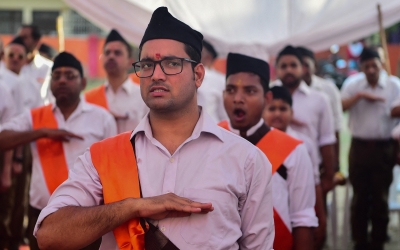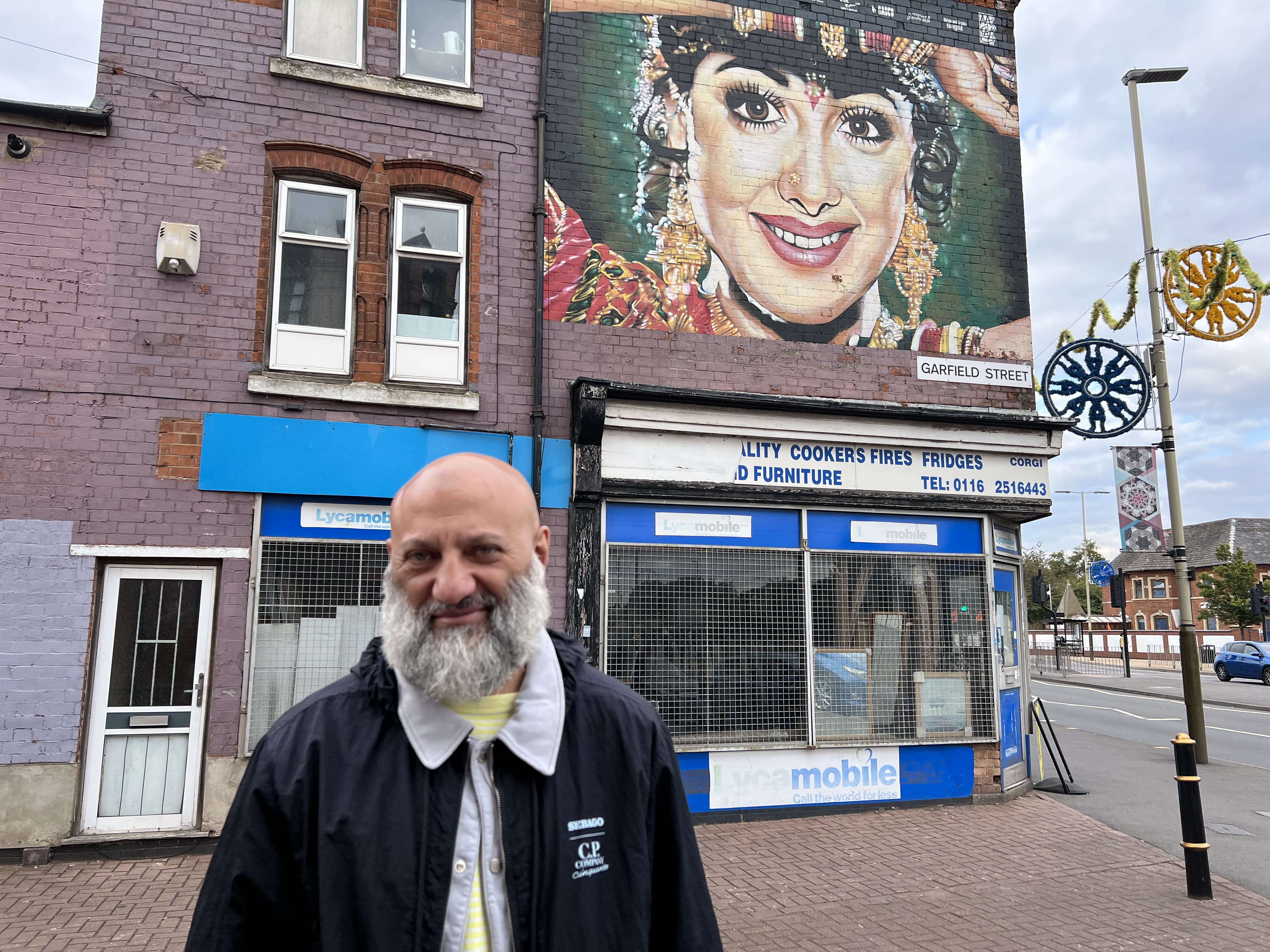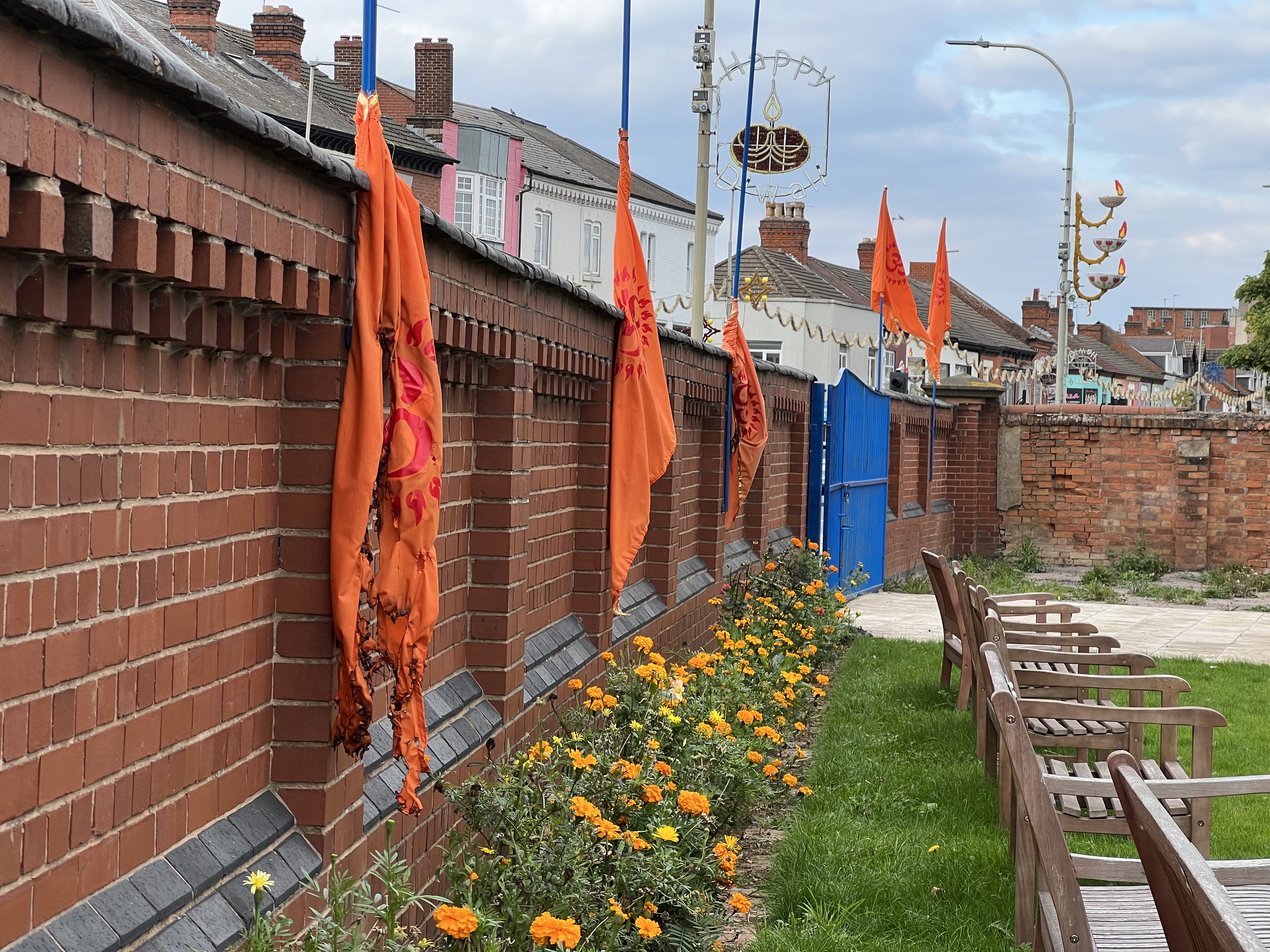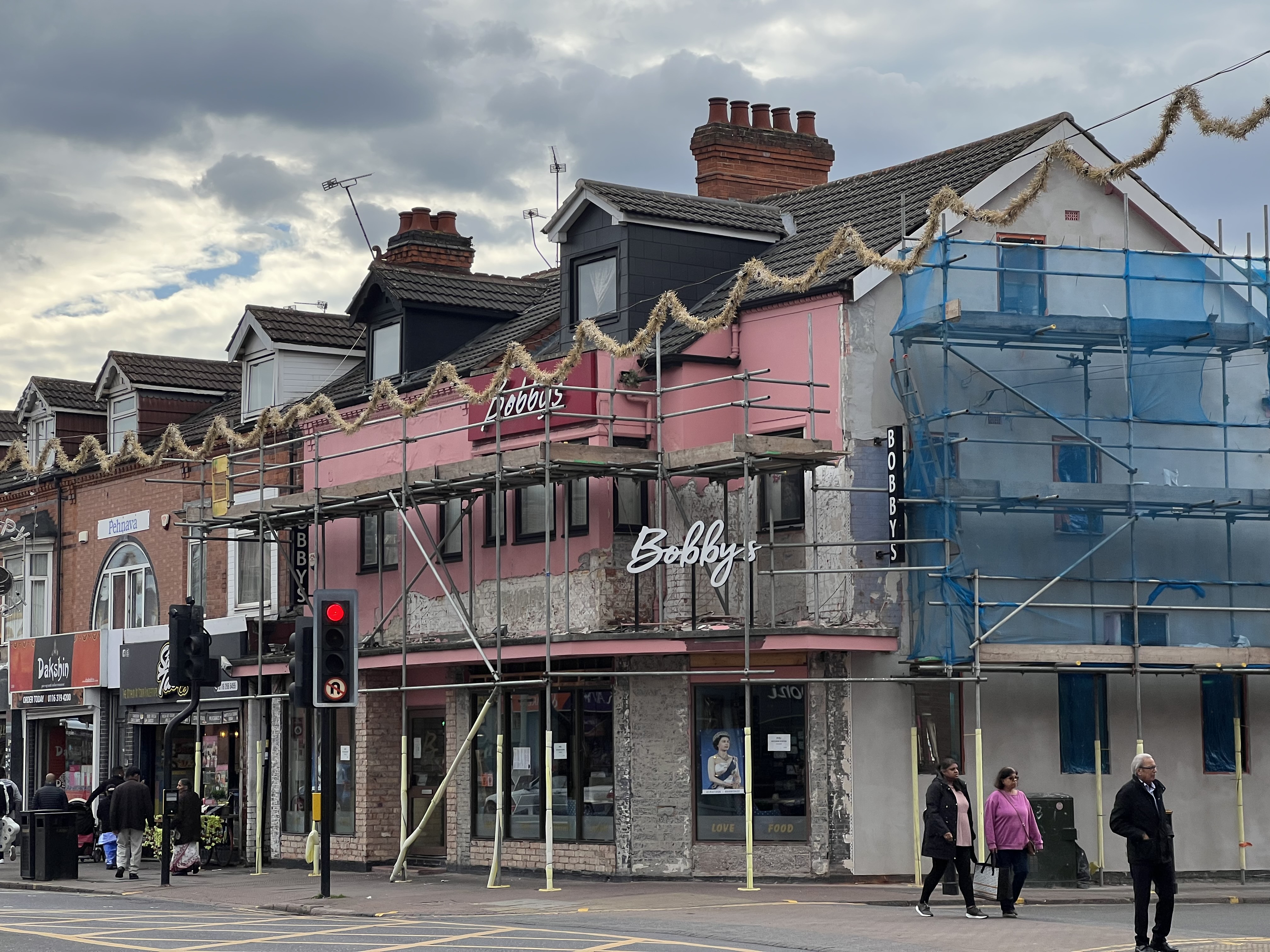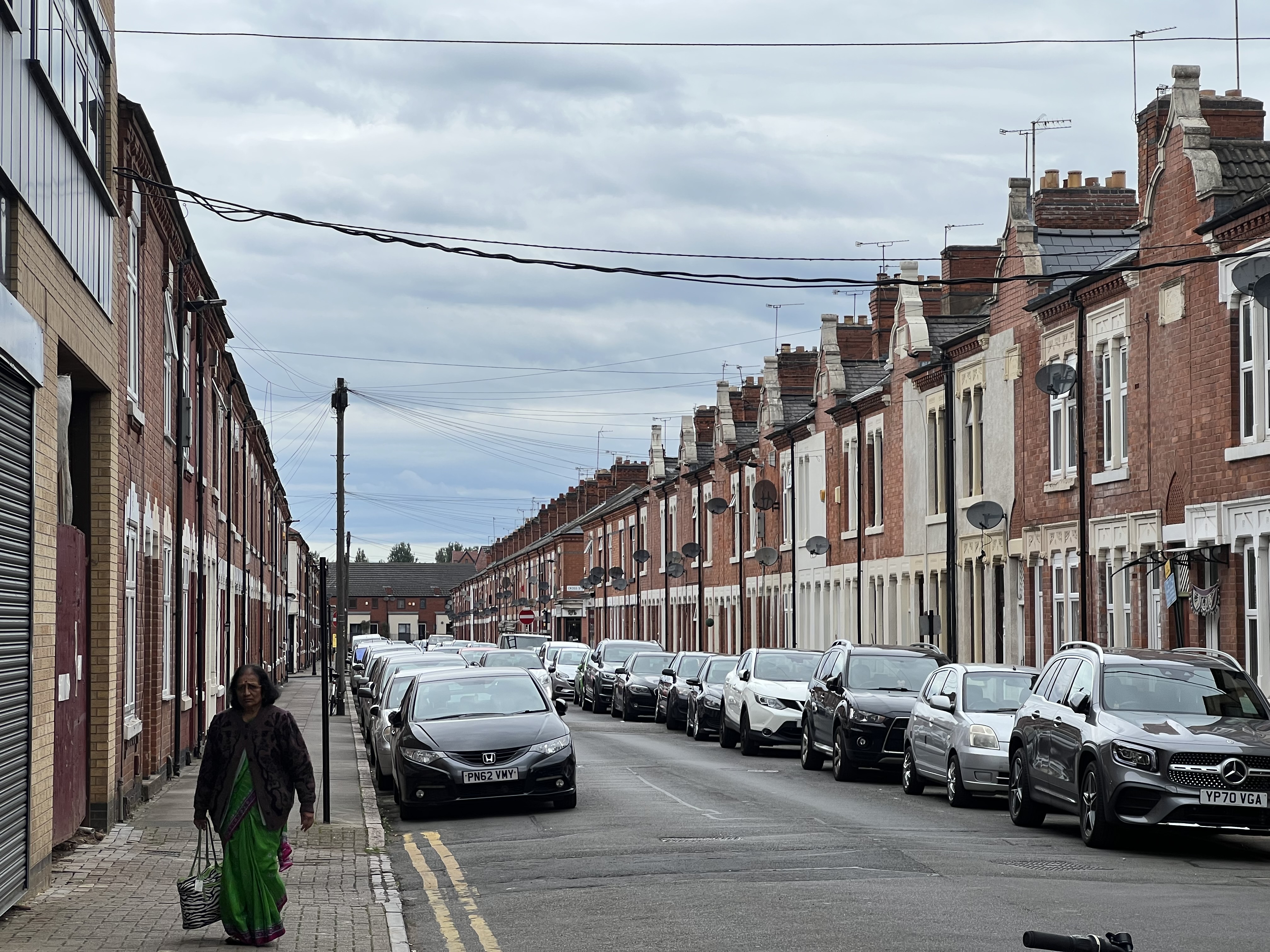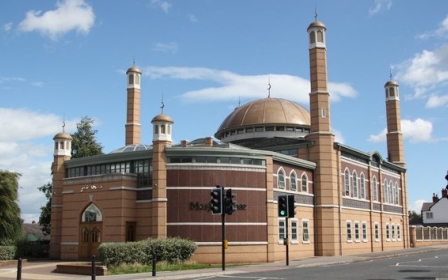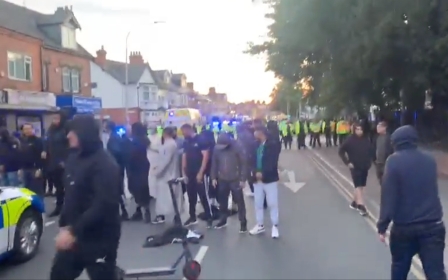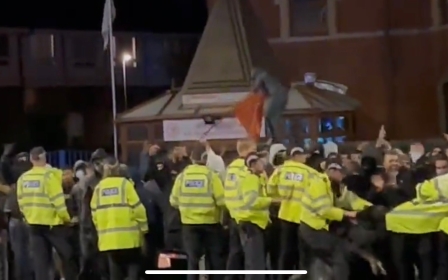Leicester riots: How Hindutva nationalism pushed a city to the brink
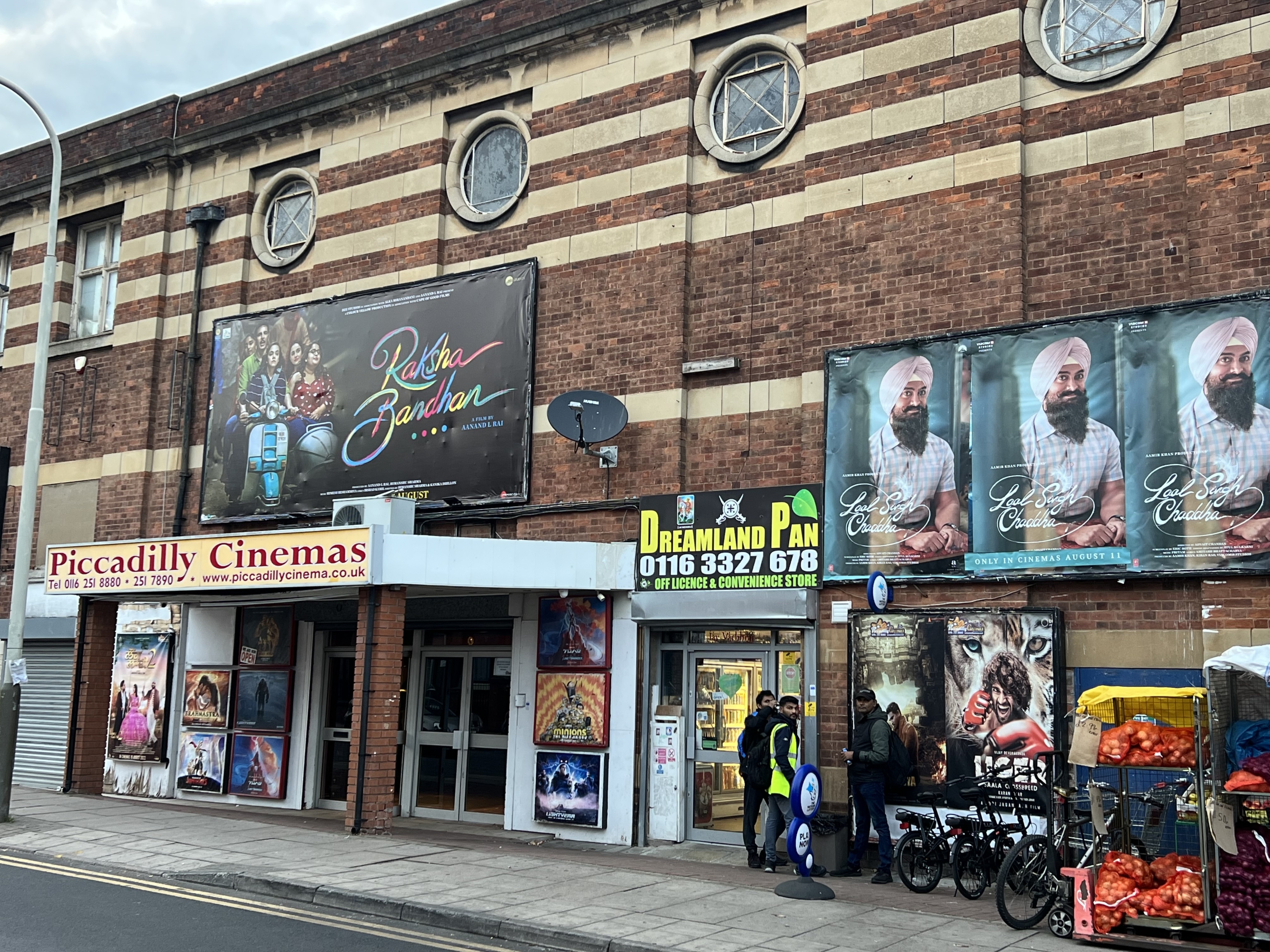
It's late afternoon, and silence has replaced the hustle and bustle in the restaurants and clothes shops on Leicester's celebrated Golden Mile along Belgrave Road.
Premises that would typically be full of customers riffling through saris and buying Indian desserts are now nearly empty, with old Diwali signs and portraits of the late Queen Elizabeth II fading on shop windows. Outside, roads normally congested with traffic are almost deserted.
It has been two days since groups of masked Hindu men, some armed with metal poles, marched through parts of the Golden Mile chanting “Jai Shri Ram”, a chant appropriated by Hindu nationalists in India and frequently used to intimidate the country’s minority Muslim population.
'It caught us all by surprise, because we thought things had calmed down. But these guys came down like a military unit'
– Riaz Khan, youth worker
"I have lived here all my life, and never imagined something like this happening in Leicester," said Zubair Alli, who witnessed the violence on Saturday. "We grew up with Hindus. They're our brothers. This madness doesn't make sense."
Often viewed as a benchmark for multiculturalism in Britain, Leicester is home to the UK's largest Indian population, who are both Hindu and Muslim, outside of London.
New MEE newsletter: Jerusalem Dispatch
Sign up to get the latest insights and analysis on Israel-Palestine, alongside Turkey Unpacked and other MEE newsletters
Spanning several generations, many of Leicester's Indian population have family roots in the state of Gujarat and came to the UK via Kenya, Malawi and Uganda.
Many are descended from Indians who went to East Africa as traders and indentured labourers under British imperial rule, before emigrating to the UK. Thousands of Indians arrived in Leicester - once home to a thriving textiles industry - in the 1970s, after Ugandan President Idi Amin gave them 90 days to leave the country.
But Leicester has not been immune to the growing influence in India of Hindutva, an ideology that calls for the creation of a Hindu Rashtra, or pure Indian nation comprised only of Hindus, by marginalising the country's minority groups, including India's Christian, Dalit and Muslim communities.
Over the past few months, tensions have been simmering between the different communities after several incidents saw groups of men identifying as Hindus beating up Muslim men.
One incident in May 2022 saw a Muslim man beaten up and later hospitalised after a group of about 30 men broke his arm and bruised parts of his back, after he was asked, "Are you Muslim?"
Anti-social behaviour outside mosques, public urination, fly-tipping and playing loud music in the early hours of the morning have also created concern within Leicester's Asian community. Disinformation, disseminated mainly via WhatsApp, including fake stories of Hindu youths kidnapping a Muslim woman and mosques being attacked, compounded the situation.
Tensions came to the fore in August 2022, when Indian cricket fans walked through Leicester city centre screaming "Death to Pakistan", a chant viewed by some as a direct reference to Muslims, irrespective of whether they are from India or Pakistan.
Balaclavas and hoodies
But no one who spoke to Middle East Eye foresaw the violent scenes that gripped the city on Saturday evening. Muslim men MEE spoke to described being attacked by groups of Hindu youths. Amid the unrest, a sacred flag at the Shivalaya, the Leicestershire Brahma Samaj Hindu temple on Belgrave Road, was set on fire.
Riaz Khan, a self-confessed former football hooligan who is now an author and youth worker, still struggles to understand how these events unfolded. Standing at the edge of the Golden Mile, under a mural of Sridevi, an iconic Bollywood actress, Khan strokes his bushy white beard and sports jacket as he recounts what he saw on Saturday.
"You had bands of RSS thugs in balaclavas and hoodies, screaming and throwing bottles at us," Khan told Middle East Eye.
"It caught us all by surprise, because we thought things had calmed down. But these guys came down like a military unit, and we were left wondering, like, where the hell these guys came from."
The RSS, or Rashtriya Swayamsevak Sangh, is a paramilitary organisation set up in the early 1920s, modelled on the Italian fascist leader Benito Mussolini’s Blackshirts, and which supports the Hindutva ideology and the establishment of a Hindu Rashtra.
Rumours have circulated on social media that many of those who marched on Saturday had come from outside Leicester. Leicestershire Police later confirmed those suspicions: on Sunday the constabulary said half the people it had initially arrested had come from outside the city. Five of those arrested were from Birmingham, while others were from Solihull, Luton and London.
On Thursday, Leicestershire Police said it had arrested at least 47 people in connection with Saturday’s disorder. One man was jailed for 10 months after pleading guilty on Monday to possessing an offensive weapon, after his arrest on Saturday.
The city has never seen tensions reach this level between its Hindu and Muslim communities, with the two groups sharing a common history of fighting off racists who targeted them during the 1960s and 70s, and most recently fending off the English Defence League.
"When we were growing up, there was never a question of us asking if you were Hindu or Muslim. We may be different, but it helped that we both spoke Gujarati and came from Africa," said Shokhat Adam Patel, whose family emigrated to Leicester from East Africa nearly 40 years ago.
"The racists would label us both as Asian, and try to beat us up irrespective of what religion we were."
Pushing back against the notion that tensions began after the cricket match between India and Pakistan in August, Patel notes: "Leicester is an incredibly diverse city, with people mainly from Gujarat who came from Africa."
'This idea that the only people who support the RSS came in the last five years is absolutely false'
– Majid Freeman, community activist
He believes the source of the tension lies, in part, in the recent arrival in the city of a new demographic of Indians from Daman and Diu in Gujarat, with Portuguese passports. Like the already settled communities, those that come from Daman and Diu include Hindus and Muslims. Their arrival also coincides with years of government cutbacks and cuts to local government services, including English-speaking classes.
"We've seen a new community belonging to the Hindu faith that comes from Gujarat, but from a different part of the state. And like all new immigrants to the city, they have settled in the poorest parts of east Leicester," said Patel, who volunteers with Muslim Engagement & Development (Mend), a Muslim advocacy organisation focused on tackling Islamophobia in Britain and abroad.
"Many of these individuals are unskilled, with low-paying jobs, and live in overcrowded housing like our forefathers did in the 70s.”
Patel notes that while anti-social behaviour is not new, the Muslim community in Leicester has noticed a small minority practise a similar pattern of behaviour used by the RSS to intimidate Muslims back in India.
“Some examples of anti-social behaviour that have worried the Muslim community include playing loud music outside mosques, illegally blocking and dancing outside mosques during Hindu festivals, and slowing down in front of mosques to hoot their horns in a rather provocative manner.
"The authorities have been notified, but have not done anything to address this behaviour."
But some have questioned whether this new wave of Indian migration led to Saturday’s unrest.
In 2019, the Leicester Mercury reported that more than 100 people celebrated Modi's election win, with local politicians attending the gathering.
Majid Freeman, a community activist who filmed the protests on Saturday, also questioned the recent arrivals narrative and said “there had been rumours” of Hindutva presence for years.
“When I went on Melton Road with journalists [on Sunday], there were some people openly saying they were RSS supporters, and educated Brits who were Hindus justifying and defending them," said Freeman. "So this idea that the only people who support the RSS came in the last five years is absolutely false.
“And what about the temples who invite divisive figures like Sadhvi Rithambara - did they come in the last five years too?”
'Head in the sand'
Days after the violence, leaders from the Hindu and Muslim communities read out a joint statement of unity to condemn the attacks. Falling short of naming the RSS, Pradyumna Pradip Gajjar, leader of the Iskcon Hindu temple, read the joint statement and condemned "outside influences" that played a role in the violence.
But the reticence among Leicester's Hindu leaders to call out the RSS and Hindutva has frustrated many within the city's Indian Muslim community. One community leader told MEE anonymously that the Hindu community was "burying its head in the sand" by refusing to mention Hindutva, the RSS or its international affiliate, the HSS. Another senior Muslim leader said they felt Hindu leaders were "treading carefully to avoid upsetting members of their congregation".
Dharmesh Lakhani typically takes a day off on Tuesday. But the Hindu restaurateur, who owns Bobby's on the Golden Mile, has not had a wink of sleep since Saturday. Fielding calls from concerned relatives from Leicester and beyond, Lakhani seeks to reassure them as he sits inside his empty restaurant.
He was among the different faith leaders who put their names to the unity statement.
"The burning of the flag was unfortunate, but it was heartwarming to see an imam stand in front of the Mandir to protect it," said Lakhani.
"But why give these people, the RSS, or whoever it is, a platform or importance by naming them? We live in the UK, and any ideology from abroad should stay there."
Sharmen Rahman, a councillor in Leicester, sympathised with the city's Hindu community and its hesitancy to actively condemn the RSS and Hindutva, but recognised why Indian Muslims were left feeling vulnerable due to a lack of condemnation of RSS.
"For the last 25 years, the Muslim community has been told to condemn every terrorist act done in the name of Islam, irrespective of whether it was done at home or abroad, and how is that fair to be asking the Hindu community to do the same because of a small minority?" Rahman asked as she sat in a tea shop.
"But equally, many of my constituents from India who are Muslim have relatives that have lived through the real-life implications of this ideology, and it strikes the fear of God just thinking about this ideology being so close to home."
The shadow of deadly communal violence in India looms large over Leicester. This year marks the 20th anniversary of the Gujarat riots, in which 790 Muslims and 254 Hindus were killed. The riots were sparked by the death of 58 Hindu pilgrims returning from Ayodhya after their train was set on fire, leading to revenge attacks against Muslims.
Indian Prime Minister Narendra Modi, chief minister of Gujarat at the time, was accused of turning a blind eye to the warning signs that led to the outbreak of violence.
The UK was among countries that imposed a travel ban on Modi, although this was rescinded a decade later, before Modi’s right-wing Bharatiya Janata Party (BJP) - which draws on the RSS for support - won power in 2014.
Modi's rise has coincided with an uptick in violence towards India's minority groups, particularly an uptick in violence towards Christians,
'It strikes the fear of God just thinking about this ideology being so close to home'
– Sharmen Rahman, councillor
Sever
The scenes from l
On Mond
P
For now, Kh
"Forget the elders. They live on
Middle East Eye delivers independent and unrivalled coverage and analysis of the Middle East, North Africa and beyond. To learn more about republishing this content and the associated fees, please fill out this form. More about MEE can be found here.


